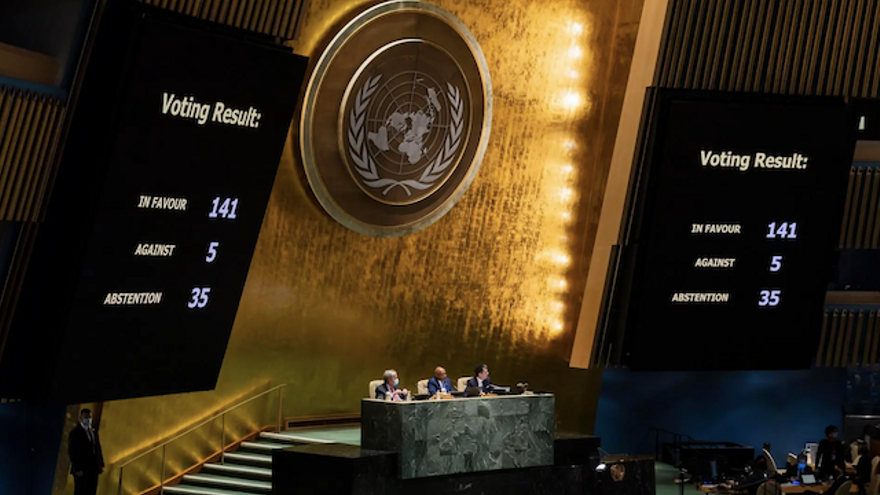
![]() Frank Calzón, Washington, 12 December 2023 — The temperature plummeted last night, and rain mixed with snow covered the sidewalks. The trees are already naked of their leaves, forming a multicolored carpet in the gardens of the Capitol.
Frank Calzón, Washington, 12 December 2023 — The temperature plummeted last night, and rain mixed with snow covered the sidewalks. The trees are already naked of their leaves, forming a multicolored carpet in the gardens of the Capitol.
Volodymyr Zelensky, the president of Ukraine, has just arrived in Washington to meet immediately with senators and congressmen and with President Joe Biden, who continues to pressure the legislature to approve military aid to Kiev.
The Ukrainian leader disconcerted Vladimir Putin, who hoped to enter Kiev victoriously in a matter of weeks. The war had begun, and the expectation was that the Ukrainians would not be able to stop the advance of the Russian army. Several governments offered Zelensky a plane to leave his country. But the resistance of the Ukrainians surprised Putin and the world.
In a speech at the U.S. National Defense University, a day before the planned visit to the White House, the Ukrainian leader said: “We know what we have to do, and you can count on Ukraine, and we hope the same, to be able to count on you.”
In the press and in the official world of Washington, D.C., the high cost of military aid that Ukraine needs in order not to become a satellite of Moscow is discussed. Beyond the geopolitical consequences, if Russia manages to occupy Kiev, the U.S. and Europe would have to considerably increase military budgets.
The crisis in Ukraine has forced specialists, academics, senators and congressmen to examine the role Iran, China, Syria and Cuba play in the conflict
The crisis in Ukraine has forced specialists, academics, senators and congressmen to examine the role Iran, China, Syria and Cuba play in the conflict.
The hundreds of young Cubans in the Russian army fighting in Ukraine are part of that analysis. The State Department accused Havana of distributing Russian disinformation around the world and of serving Moscow’s interests in international organizations.
Cuba, several diplomats point out, fought against all odds so that Russia was not expelled from the United Nations Human Rights Council in Geneva, but its departure was approved by the United Nations General Assembly, the same assembly that has often criticized the U.S. embargo.
Recently, Sweden said it has evidence of the use of torture in Cuba and has requested that the European Union suspend the economic agreement with the Island, arguing that it does not comply with the human rights obligations that are part of the treaty. For Europeans, Cuba’s alliance with Putin in Ukraine is important, and few believe that Havana did not know about the flights taking hundreds of young Cubans to Russia.
These are difficult matters but not impossible to solve. The Cuban Minister of Foreign Affairs expressed his concern when Russia was expelled from the Human Rights Council, saying that Cuba’s enemies would also try to expel Cuba from the international organization.
But Cuba has powerful allies: China, Iran, Syria and Russia, among others. It can count, at least in Latin America, on the votes of Venezuela, Nicaragua, Mexico, Bolivia, Colombia and several nations of the English Caribbean. The newly elected governments of Argentina and Ecuador add to the opposition to the Cuban regime of Uruguay, Costa Rica and some Central American countries. Neither Havana, nor Caracas nor Managua was invited to the inauguration in Buenos Aires, where prominent figures, including the King of Spain, gathered. Among the guests was the journalist and now representative to the Chamber, the Cuban American María Elvira Salazar.
The vote in the General Assembly to expel Cuba from the Human Rights Council, if it happens, will be secret. But speculation has already skyrocketed.
Translated by Regina Anavy
____________
COLLABORATE WITH OUR WORK: The 14ymedio team is committed to practicing serious journalism that reflects Cuba’s reality in all its depth. Thank you for joining us on this long journey. We invite you to continue supporting us by becoming a member of 14ymedio now. Together we can continue transforming journalism in Cuba.
